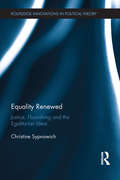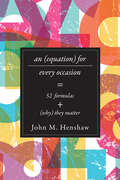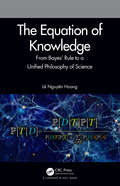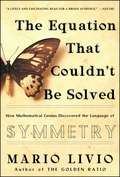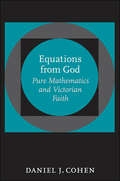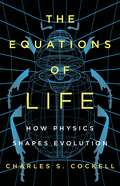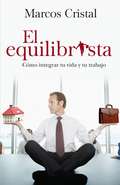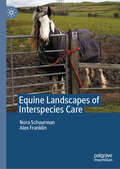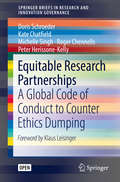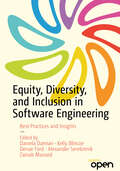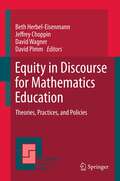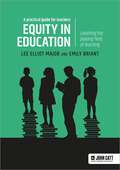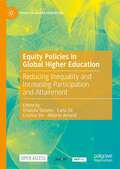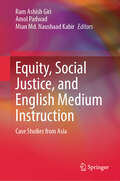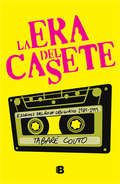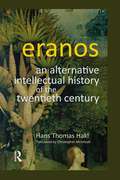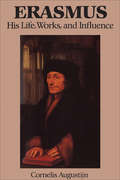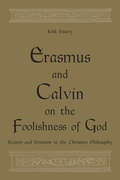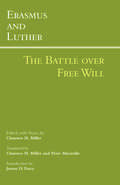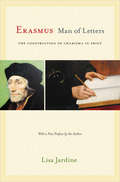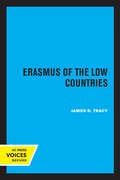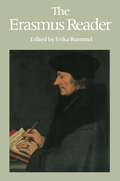- Table View
- List View
Equality Renewed: Justice, Flourishing and the Egalitarian Ideal (Routledge Innovations in Political Theory)
by Christine SypnowichHow should we approach the daunting task of renewing the ideal of equality? In this book, Christine Sypnowich proposes a theory of equality centred on human flourishing or wellbeing. She argues that egalitarianism should be understood as seeking to make people more equal in the constituents of a good life. Inequality is a social ill because of the damage it does to human flourishing: unequal distribution of wealth can have the effect that some people are poorly housed, badly nourished, ill-educated, unhappy or uncultured, among other things. When we seek to make people more equal our concern is not just resources or property, but how people fare under one distribution or another. Ultimately, the best answer to the question, ‘equality of what?,’ is some conception of flourishing, since whatever policies or principles we adopt, it is flourishing that we hope will be more equal as a result of our endeavours. Sypnowich calls for both retrieval and innovation. What is to be retrieved is the ideal of equality itself, which is often assumed as a background condition of theories of justice, yet at the same time, dismissed as too homogenising, abstract and rigid a criterion for political argument. We must retrieve the ideal of equality as a central political principle. In doing so, she casts doubt on the value of focussing on cultural difference, and rejects the idea of neutrality that dominates contemporary political philosophy in favour of a view of the state as enabling the betterment of its citizens.
An Equation for Every Occasion: Fifty-Two Formulas and Why They Matter
by John M. HenshawA little math, a bit of history, and a dose of storytelling combine to reveal the importance of equations in everyday life.With this fun romp through the world of equations we encounter in our everyday lives, you’ll find yourself flipping through the stories of fifty-two formulas faster than a deck of cards. John M. Henshaw’s intriguing true accounts, each inspired by a different mathematical equation, are both succinct and easy to read. His tales come from the spheres of sports, business, history, the arts, science, and technology. Anecdotes about famous equations, like E=mc2, appear alongside tales of not-so-famous—but equally fascinating—equations, such as the one used to determine the SPF number for sunscreen. Drawn from the breadth of human endeavor, Henshaw's stories demonstrate the power and utility of math. He entertains us by exploring the ways that equations can be used to explain, among other things, Ponzi schemes, the placebo effect, "dog years," IQ, the wave mechanics of tsunamis, the troubled modern beekeeping industry, and the Challenger disaster. Smartly conceived and fast paced, his book offers something for anyone curious about math and its impacts.
The Equation of Knowledge: From Bayes' Rule to a Unified Philosophy of Science
by Lê Nguyên HoangThe Equation of Knowledge: From Bayes' Rule to a Unified Philosophy of Science introduces readers to the Bayesian approach to science: teasing out the link between probability and knowledge. The author strives to make this book accessible to a very broad audience, suitable for professionals, students, and academics, as well as the enthusiastic amateur scientist/mathematician. This book also shows how Bayesianism sheds new light on nearly all areas of knowledge, from philosophy to mathematics, science and engineering, but also law, politics and everyday decision-making. Bayesian thinking is an important topic for research, which has seen dramatic progress in the recent years, and has a significant role to play in the understanding and development of AI and Machine Learning, among many other things. This book seeks to act as a tool for proselytising the benefits and limits of Bayesianism to a wider public. Features Presents the Bayesian approach as a unifying scientific method for a wide range of topics Suitable for a broad audience, including professionals, students, and academics Provides a more accessible, philosophical introduction to the subject that is offered elsewhere
The Equation that Couldn't Be Solved: How Mathematical Genius Discovered the Language of Symmetry
by Mario LivioWhat do Bach's compositions, Rubik's Cube, the way we choose our mates, and the physics of subatomic particles have in common? All are governed by the laws of symmetry, which elegantly unify scientific and artistic principles. Yet the mathematical language of symmetry-known as group theory-did not emerge from the study of symmetry at all, but from an equation that couldn't be solved. For thousands of years mathematicians solved progressively more difficult algebraic equations, until they encountered the quintic equation, which resisted solution for three centuries. Working independently, two great prodigies ultimately proved that the quintic cannot be solved by a simple formula. These geniuses, a Norwegian named Niels Henrik Abel and a romantic Frenchman named Évariste Galois, both died tragically young. Their incredible labor, however, produced the origins of group theory. The first extensive, popular account of the mathematics of symmetry and order, The Equation That Couldn't Be Solved is told not through abstract formulas but in a beautifully written and dramatic account of the lives and work of some of the greatest and most intriguing mathematicians in history.
Equations from God: Pure Mathematics and Victorian Faith (Johns Hopkins Studies in the History of Mathematics)
by Daniel J. CohenThroughout history, application rather than abstraction has been the prominent driving force in mathematics. From the compass and sextant to partial differential equations, mathematical advances were spurred by the desire for better navigation tools, weaponry, and construction methods. But the religious upheaval in Victorian England and the fledgling United States opened the way for the rediscovery of pure mathematics, a tradition rooted in Ancient Greece.In Equations from God, Daniel J. Cohen captures the origins of the rebirth of abstract mathematics in the intellectual quest to rise above common existence and touch the mind of the deity. Using an array of published and private sources, Cohen shows how philosophers and mathematicians seized upon the beautiful simplicity inherent in mathematical laws to reconnect with the divine and traces the route by which the divinely inspired mathematics of the Victorian era begot later secular philosophies.
Equations from God: Pure Mathematics and Victorian Faith (Johns Hopkins Studies in the History of Technology)
by Daniel J. CohenThis illuminating history explores the complex relationship between mathematics, religious belief, and Victorian culture.Throughout history, application rather than abstraction has been the prominent driving force in mathematics. From the compass and sextant to partial differential equations, mathematical advances were spurred by the desire for better navigation tools, weaponry, and construction methods. But the religious upheaval in Victorian England and the fledgling United States opened the way for the rediscovery of pure mathematics, a tradition rooted in Ancient Greece.In Equations from God, Daniel J. Cohen captures the origins of the rebirth of abstract mathematics in the intellectual quest to rise above common existence and touch the mind of the deity. Using an array of published and private sources, Cohen shows how philosophers and mathematicians seized upon the beautiful simplicity inherent in mathematical laws to reconnect with the divine and traces the route by which the divinely inspired mathematics of the Victorian era begot later secular philosophies.
The Equations of Life: How Physics Shapes Evolution
by Charles S. CockellA groundbreaking argument for why alien life will evolve to be much like life here on EarthWe are all familiar with the popular idea of strange alien life wildly different from life on earth inhabiting other planets. Maybe it's made of silicon! Maybe it has wheels! Or maybe it doesn't. In The Equations of Life, biologist Charles S. Cockell makes the forceful argument that the laws of physics narrowly constrain how life can evolve, making evolution's outcomes predictable. If we were to find on a distant planet something very much like a lady bug eating something like an aphid, we shouldn't be surprised. The forms of life are guided by a limited set of rules, and as a result, there is a narrow set of solutions to the challenges of existence.A remarkable scientific contribution breathing new life into Darwin's theory of evolution, The Equations of Life makes a radical argument about what life can--and can't--be.
EQUILIBRISTA, EL (EBOOK)
by Marcos CristalNo es noticia que entre las organizaciones y las personas surjan conflictos y tensiones. La noticia es cómo puedan resolverse. Cuál es el lugar que le damos a nuestra felicidad? Es posible encontrarla en nuestro trabajo? Qué costo pagamos por haber dejado de buscarla? Es responsabilidad también de las empresas? Cuál es la pérdida económica que sufren las organizaciones por no ocuparse de la felicidad de su gente? Es el éxito el camino hacia la felicidad? Soy yo el que maneja las riendas de mi vida? Soy yo un equilibrista? Si te resultan familiares algunas de estas preguntas, sin duda, este libro es para ti. Marcos Cristal nos invita a un viaje exploratorio, de la mano de la filosofía. Mezcla de novela y ensayo, logra un texto revelador a través de situaciones cotidianas de personajes con los que te identificarás rápidamente, nos hace reflexionar sobre las preguntas más esenciales de la vida, sin detenerse en interrogantes y formulando recomendaciones concretas y fecundas para que busques el camino personal que te permita despertar un enamoramiento por lo que haces, y adueñarte del proyecto en el que participas. Un libro fundamental que cambiará tu forma de ver la vida y tu trabajo, que te impulsará a una transformación radical. Esta obra es un buen candidato a ser, a la vez, un buen compañero de ruta, un libro de cabecera y un manual de consulta permanente.
Equine Landscapes of Interspecies Care
by Nora Schuurman Alex FranklinThis book focuses on the spaces and practices of caring for horses, explored in a series of case studies set across the equine lifespan. For horses, everyday practices of care as well as ever-changing understandings of what is good care directly shape their living conditions and lives with humans. In this book, questions of animal ethics and welfare are approached in a tangible way by exploring the relationships and practices of interspecies care across a range of different spaces, including horse yards, training grounds, farms, rescue centres and the street. The chapters illuminate the ways in which interspecies care ties horses to human society and culture, addressing care practices in different stages of the equine life cycle. Through a unique set of case-studies addressing issues such as training, working, rescue, aging and death, the book offers a clear overview of how humans shape the lifespan of animals living under their care. It simultaneously foregrounds the agency of animals in this process and how such agency is interpreted and responded to by humans. With its theoretically solid analysis of rigorous empirical study, the book answers the need to understand human connection to the nonhuman world within the everyday practices and spaces of contemporary society and culture.
Equitable Research Partnerships: A Global Code of Conduct to Counter Ethics Dumping (SpringerBriefs in Research and Innovation Governance)
by Doris Schroeder Kate Chatfield Michelle Singh Roger Chennells Peter Herissone-KellyThis open access book offers insights into the development of the ground-breaking Global Code of Conduct for Research in Resource-Poor Settings (GCC) and the San Code of Research Ethics. Using a new, intuitive moral framework predicated on fairness, respect, care and honesty, both codes target ethics dumping – the export of unethical research practices from a high-income setting to a lower- or middle-income setting. The book is a rich resource of information and argument for any research stakeholder who opposes double standards in research. It will be indispensable for applicants to European Union framework programmes, as the GCC is now a mandatory reference document for EU funding.
Equity, Diversity, and Inclusion in Software Engineering: Best Practices and Insights
by Daniela Damian Kelly Blincoe Denae Ford Alexander Serebrenik Zainab MasoodCreating an inclusive environment where different software developers can feel welcome and leverage their talents is an ethical imperative no company can ignore. Indeed, software organizations have in the last decade been trying to make changes for a more diverse and inclusive software development environment. The push for increased diversity in software has been a public one, from annual diversity reports by some of the worlds’ most visible companies such as Microsoft, Google, and Facebook, to large projects such as Linux Foundation’s Software Developer Diversity and Inclusion project that explores, evaluates, and promotes best practices from research and industry to increase diversity and inclusion in software engineering. Despite these many efforts, diversity remains low. Numbers from the software industry show that less than 25% of software engineers are women. Diversity is also low in regards to many other facets of diversity. This book provides an overview of research into the different aspects of diversity and inclusion in software engineering, as well as the tools, methods, and practices proposed to foster diversity and to build inclusive software teams and development environments. It describes research challenges in studying diversity and inclusion in software. Readers will be challenged to consider how they are contributing to a lack of inclusion and what they can do to improve inclusion in the software industry.What You Will Learn Aspects of diversity (e.g., age, culture, gender, race) and relationship to software engineering activities and outcomesHow to measure diversity Investigations of intersectionality in software engineering Research methods for the study of diversity and inclusion in software engineering Empirical studies of effective practices to foster diversity and inclusion in software engineering Interventions and programs that have been used to successfully support retention in software engineering Software engineering education for diverse and inclusive software engineering, and proven teaching methods/environments that support diverse and inclusive software engineering Who This Book Is For For Researchers, the book presents a state-of-the-art collection of existing studies into many aspects of diversity, methods, and tools proposed and tried out in practice, challenges in research, and contributing to a research agenda on this topic for future studies. For Industry practitioners, the book describes efforts to investigate diversity in software teams, whether in corporate or open source environments. It also describes empirical evidence about effectiveness of certain methods and approaches to foster diversity and inclusion in software development. For Educators,the book describes practices and effective changes in Computer Science/Software Engineering curricula that were found as effective in engaging learners from minoritized groups, creating inclusive software teams that are diverse, and which relate to educational material useful for training for diversity, equity, and inclusion.
Equity in Discourse for Mathematics Education
by Beth Herbel-Eisenmann David Pimm David Wagner Jeffrey ChoppinThis book explores the connection between the ways people speak in mathematics classrooms and their opportunities to learn mathematics. The words spoken, heard, written and read in mathematics classrooms shape students' sense of what mathematics is and of what people can do with mathematics. The authors employ multiple perspectives to consider the means for transformative action with respect to increasing opportunities for traditionally marginalized students to form mathematical identities that resonate with their cultural, social, linguistic, and political beings.
Equity in education: Levelling the playing field of learning - a practical guide for teachers
by Lee Elliot Major Emily Briant'Comprehensive and groundbreaking.' Dylan WiliamEquity in Education sets out a new equity-based approach in education to help teachers improve the prospects of under-resourced and working-class pupils.The equity approach recognises that we must address our own cultural biases and barriers within the classroom, while helping to remove extra barriers to learning experienced by children outside schools. Based on thousands of research studies and years of working with expert teachers, the book sets out the principles and practical strategies for trainee teachers, teachers and teacher leaders.Adopting an equity mindset involves four key principles:· equity not equality - doing more to overcome the extra barriers some learners experience· capacity not deficit thinking - recognising the talents in all pupils· deep not shallow relationships - developing authentic individual relationships with pupils· multiple not singular talents - acknowledging that human talents come in many forms.Equity in Education also advocates the national policies that would enable teachers to prioritise an equitable approach and reduce divides between the education haves and have-nots.
Equity in education: Levelling the playing field of learning - a practical guide for teachers
by Lee Elliot Major Emily Briant'Comprehensive and groundbreaking.' Dylan WiliamEquity in Education sets out a new equity-based approach in education to help teachers improve the prospects of under-resourced and working-class pupils.The equity approach recognises that we must address our own cultural biases and barriers within the classroom, while helping to remove extra barriers to learning experienced by children outside schools. Based on thousands of research studies and years of working with expert teachers, the book sets out the principles and practical strategies for trainee teachers, teachers and teacher leaders.Adopting an equity mindset involves four key principles:· equity not equality - doing more to overcome the extra barriers some learners experience· capacity not deficit thinking - recognising the talents in all pupils· deep not shallow relationships - developing authentic individual relationships with pupils· multiple not singular talents - acknowledging that human talents come in many forms.Equity in Education also advocates the national policies that would enable teachers to prioritise an equitable approach and reduce divides between the education haves and have-nots.
Equity Policies in Global Higher Education: Reducing Inequality and Increasing Participation and Attainment (Issues in Higher Education)
by Alberto Amaral Orlanda Tavares Cristina Sin Carla SáThis book discusses and analyses global policies and practices aimed at promoting equity in higher education participation and attainment. Although the massification of higher education systems has facilitated the participation of students from deprived backgrounds, socioeconomic inequalities persist in access to the most prestigious institutions and programmes. Privileged students benefit from a number of advantages in the competition for selective and scarce places: access to information, lower aversion to debt, higher expectations, better previous schooling and higher academic achievement. The chapters present a critical analysis of equity policies in different countries – with or without affirmative action policies, within a context of neoliberal policies or within a social democratic model – and the reasons why they have failed to promote equity and fairness, preventing students from achieving their full educational potential.This is an open access book.
Equity, Social Justice, and English Medium Instruction: Case Studies from Asia
by Ram Ashish Giri Amol Padwad Mian Md. Naushaad KabirThis book contributes to the existing body of knowledge on English Medium Instruction's (EMI) role in equity and social justice and adds to the ongoing conversation by providing the Asian perspective to it. It showcases scholarly works by scholars and researchers in the field and presents their diverse voices on EMI and social justice in a single volume. This book focuses on different aspects of the issue on EMI, equity, and social justice in different Asian contexts while providing a holistic picture of social justice in English language teaching in the region. It focuses on the current context-specific EMI practices situating them in their historical pretext, employs prevalent theoretical as well as methodological models and approaches to study such practices, considers curricular and pedagogical considerations adapted to address the multitude of needs of EMI, and examines controversies surrounding the conceptualization, plan/policy, and implementation strategies of EMI.
La era del casete: Escritos del rock uruguayo 1985-1995
by Tabaré CoutoUn libro que recorre las expresiones culturales y los principales referentes de los años 80. El rock, las publicaciones, la calle y el Uruguay post dictadura en un libro donde la voz es de los protagonistas de ese movimiento. Tabaré Couto un referente de la comunicación de esa época escribe y recopila notas que pintan una década, un movimiento que hoy es mirado con nostalgia. Los lectores encontrarán en este libro una plétora de información que proviene de una gran cantidad de publicaciones (artículos, entrevistas, reseñas de discos y conciertos) sobre rock uruguayo, aparecidas durante la década que va de 1985 a 1995. Tabaré Couto, activo participante de la movida que rodeó al rock de aquella época, relee, con prosa elocuente y con la ayuda de sus recuerdos, esas fuentes. Su memoria aporta no solo datos de importancia, sino también interpretaciones personales que arrojan nueva luz sobre aquel fenómeno. Pero tal vez lo más significativo de este trabajo sea su capacidad de ver, con la perspectiva que da el tiempo, con agudeza, nostalgia y autocrítica, no solo los hechos sino también las líneas de fuerza que caracterizaron ese momento histórico. Su visión de ese proceso, que incluye esclarecedoras alusiones al panorama político y social del Uruguay de aquellos tiempos, es no solo compleja e inteligente, sino que además está aderezada por la ecuanimidad de aquel que no ha vivido en vano. Eso no quiere decir que su mirada, a fuer de serena, sea distante. Por el contrario, este es un libro escrito desde el sentimiento y la emoción, por alguien que supo vivir el rock de aquellos tiempos pasionalmente. Gracias a este libro, la historia del rock uruguayo se ha vuelto más rica e inteligible. Gustavo Verdesio
Eranos: An Alternative Intellectual History of the Twentieth Century (Gender, Theology And Spirituality Ser.)
by Hans Thomas HaklEvery year since 1933 many of the world's leading intellectuals have met on Lake Maggiore to discuss the latest developments in philosophy, history, art and science and, in particular, to explore the mystical and symbolic in religion. The Eranos Meetings - named after the Greek word for a banquet where the guests bring the food - constitute one of the most important gatherings of scholars in the twentieth century. The book presents a set of portraits of some of the century's most influential thinkers, all participants at Eranos: Carl Jung, Erich Neumann, Mircea Eliade, Martin Buber, Walter Otto, Paul Tillich, Gershom Scholem, Herbert Read, Joseph Campbell, Erwin Schrodinger, Karl Kereyni, D.T. Suzuki, and Adolph Portmann. The volume presents a critical appraisal of the views of these men, how the exchange of ideas encouraged by Eranos influenced each, and examines the attraction of these esotericists towards authoritarian politics.
Erasmus: His Life, Works, and Influence
by Cornelis Augustijn J. C. GraysonErasmus: His Life, Works, and Influence is a comprehensive introduction to Erasmus's life, works, and thoughts. It integrates the best scholarship of the past twenty years and will appeal to undergraduates in all areas of cultural history as well as Erasmus specialists.
Erasmus and Calvin on the Foolishness of God: Reason and Emotion in the Christian Philosophy
by Kirk EssaryWhat did Paul mean when he wrote that the foolishness of God is wiser than human wisdom? Through close analysis of the sixteenth-century reception of Paul's discourses of folly, this book examines the role of the New Testament in the development of what Erasmus and John Calvin refer to as the “Christian philosophy.” Erasmus and Calvin on the Foolishness of God reveals the importance of Pauline rhetoric in the development of humanist critiques of scholasticism while charting the formation of a specifically affective approach to religious epistemology and theological method. As the first book-length examination of Calvin's indebtedness to Erasmus, which also considers the participation of Bullinger, Pellikan, and Melanchthon in an Erasmian exegetical milieu, it is a case study in the complicated cross-confessional exchange of ideas in the sixteenth century. Kirk Essary examines assumptions about the very nature of theology in the sixteenth century, how it was understood by leading humanist reformers, and how ideas about philosophy and rhetoric were received, appropriated, and shared in a complex intellectual and religious context.
Erasmus and Luther: The Battle over Free Will
by James D. Tracy Peter Macardle Clarence H. MillerThis compilation of writings from Erasmus and Luther's great debate--over free will and grace, and their respective efficacy for salvation--offers a fuller representation of the disputants' main arguments than has ever been available in a single volume in English. Included are key, corresponding selections from not only Erasmus' conciliatory A Discussion or Discourse concerning Free Will and Luther's forceful and fully argued rebuttal, but--with the battle now joined--from Erasmus' own forceful and fully argued rebuttal of Luther. Students of Reformation theology, Christian humanism, and sixteenth-century rhetoric will find here the key to a wider appreciation of one of early modern Christianity's most illuminating and disputed controversies.
Erasmus and Voltaire
by Ricardo J. QuinonesDespite comparisons between Erasmus and Voltaire having become common-place in the course of the nineteenth century, this is the first full study to bring them together in their careers, their works, and their historic afterlives. Each was a force for change in his time and thus ranks among the masters of modern liberalism. Beginning with the continuities between the Renaissance and the Enlightenment, award-winning scholar Ricardo J. Quinones joins Erasmus and Voltaire as voices of moderation and reason that remain capable of addressing the philosophical crises of twentieth-century thought.A companion piece to Dualisms, Quinones' 2007 book, Erasmus and Voltaire differs in method: where its predecessor looked to inveterate, unyielding differences, this new work looks to similarities. In delving beneath the obvious differences between these two intellectual giants, Quinones uncovers the great practical and spiritual vocations that unite them.
Erasmus, Man of Letters
by Lisa JardineThe name Erasmus of Rotterdam conjures up a golden age of scholarly integrity and the disinterested pursuit of knowledge, when learning could command public admiration without the need for authorial self-promotion. Lisa Jardine, however, shows that Erasmus self-consciously created his own reputation as the central figure of the European intellectual world. Erasmus himself--the historical as opposed to the figural individual--was a brilliant, maverick innovator, who achieved little formal academic recognition in his own lifetime. What Jardine offers here is not only a fascinating study of Erasmus but also a bold account of a key moment in Western history, a time when it first became possible to believe in the existence of something that could be designated "European thought."
Erasmus of the Low Countries
by James D. TracyFew historical figures have been more important in modeling the ideal of impartial critical scholarship than Erasmus of Rotterdam (1469-1536). Yet his critical scholarship, though beholden to no one, was not dispassionate. James Tracy shows how Erasmus the scholar sought through his writings to promote the moral and religious renewal of Christian society. Tracy finds the genesis of the humanist's notion of a "Christian republic" of pious and learned individuals in his "Burgundian," or Low Countries, roots. Erasmus's vision of reform, Tracy argues, sprung from a humanist tradition focusing on the importance of teaching (doctrina), a tradition from which Erasmus departed in his optimism about human nature and his deep suspicion of the powers that be. Amid the storms of Reformation controversy, he pruned back the "dissimulation" by which he had thought to convey different meanings to different readers, yet in the end he could not control the way his words were read. If Erasmus's scholarly ideal carries an enduring fascination, so too does his dilemma as a man of circumspection who would also be a reformer. This title is part of UC Press's Voices Revived program, which commemorates University of California Press’s mission to seek out and cultivate the brightest minds and give them voice, reach, and impact. Drawing on a backlist dating to 1893, Voices Revived makes high-quality, peer-reviewed scholarship accessible once again using print-on-demand technology. This title was originally published in 1966.
The Erasmus Reader
by Erika Rummel Desiderius ErasmusCollected Works of Erasmus ... thoughtfully designed to include major statements of Erasmus on civility in individual morals, humanistic study and education, the Christian life, reform of the church, and the peaceful constraint of political force. It is to my mind the most comprehensive and penetrating anthology of Erasmus' writing, forcefully revealing his central values." - Charles Trinkaus, Emeritus Professor of History, University of Michigan 'Rummel's collection makes available readable translations of Erasmus' most original and influential works - the books that made him the intellectual conscience of his generation of scholars and the inspiration of many Reformers who took positions he did not accept. They reveal the biblical scholar, the humanist and literary theorist, and the social critic that Erasmus was, far more fully and vividly than any previous anthology.' - Anthony Grafton, Program in History of Science, Princeton University 'The high quality of the Toronto edition of the Collected Works of Erasmus has earned it a central place in the libraries of scholars around the world. The Erasmus Reader extends this impact to the carrels and desks of beginning and advanced students of Renaissance and Reformation history.' - Heiko A. Oberman, Director, Division for Late Medieval and Reformation Studies, University of Arizona
